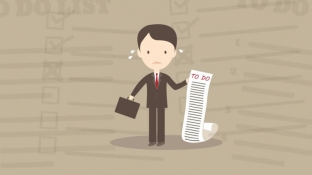If you are looking for effective methods of work, it will certainly be useful for you to learn about the Zeigarnik effect. It is named after the Lithuanian psychologist Bluma Zeigarnik, who first described the effect in the late 1920s. Its action can be traced on the example of television series, advertising, work and even love relationships.
In this article, estet-portal.com will tell about the essence and fascinating history of the discovery of the Zeigarnik effect, as well as about the possibilities of using it to improve life.
The Zeigarnik Effect – when unfinished business haunts you
There is evidence that Zeigarnik noticed the effect of this effect while visiting a cafe. She drew attention to the waiters who easily memorized complex orders, but forgot them immediately after the order was issued. Those. incomplete orders were kept in memory until they were completed.

Returning to the work environment, Bluma Zeigarnik conducted a study in which the participants had to solve various tasks. At the same time, some volunteers were interrupted during the tasks, and at the end they were asked to describe the tasks they were working on.
It turned out that both adults and children were 90% better at recalling tasks that were interrupted. Thus, Zeigarnik concluded that we remember incomplete tasks better.
How does the Zeigarnik effect affect productivity
Since obsessive thoughts about unfinished business almost always haunt us, the key to productivity is to focus on one task for a certain period of time. At the same time, multitasking and long breaks will not do any good.
Completion of the case means peace of mind, and intrusive thoughts cause unnecessary anxiety and irritation. Since multitasking involves constantly switching attention from one task to another, the brain does not allow you to fully focus on a new task, since you have not yet completed the previous one.
That's why productivity techniques like Pomodoro work: they allow you to eliminate distractions for a certain amount of time and complete the task as quickly and efficiently as possible.
Read also: Stop procrastination before it stops you
By the way, procrastinators can also take advantage of the Zeigarnik effect to get started on work they keep putting off. The fact is that in order to complete the task, you must begin to perform it. How to force yourself to get to work – that's a completely different question. Main – begin the tasks that you can do.
Reward Expectations and the Zeigarnik Effect: Why the 8-Hour Workday – not the best idea
A 2006 study published in the Journal of Personality showed that the expectation of reward can neutralize the Zeigarnik effect. During the study, volunteers were asked to complete a task, during which they were distracted. At the same time, one group was told that they would receive a monetary reward for participation, and the second was not told anything.As a result, 86% of the subjects who were unaware of the reward decided to return to the task after the break. Of the second group, only 58% of the volunteers made this choice. After receiving the reward, the subjects saw no point in continuing what they started. What's more, volunteers who were waiting for a reward spent less time on the task by starting it again.
What does the 8-hour workday have to do with it? The end of the working day can be compared to the suspension of the study: after the expiration of 8 hours, the task is interrupted. And the rate that a person receives for 1 working day is the expected reward. Thus, leaving work, many put a tick in front of the completed working day and, accordingly, mentally receive a reward for honestly worked 8 hours, while losing motivation to complete the task.
See also:
Swedish experience: why you should switch to a 6-hour working day
Based on the above, psychologists recommend that employers opt for flexible working hours and rewards for work done, rather than hours spent in the office. By ensuring an optimal balance between work and personal life, the employer will only benefit, as the employee will feel comfortable and motivated to complete the maximum tasks in the shortest possible time.






Add a comment